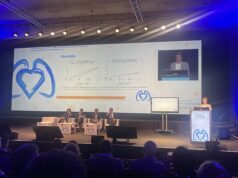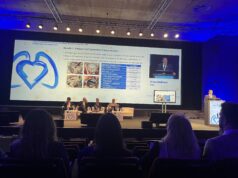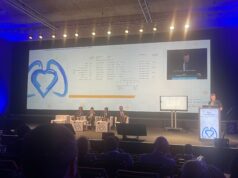
Seven-year results of the PERIGON pivotal trial, assessing the clinical and haemodynamic performance of the Avalus (Medtronic) pericardial aortic bioprosthesis, demonstrate the sustained durability of the device, investigators say.
Joseph Sabik (Cleveland Medical Center, Cleveland, USA), the trial’s North America principal investigator, presented the findings during a late-breaking trial session at the European Association of Cardio-Thoracic Surgery (EACTS) 2024 annual meeting (9–12 October, Lisbon, Portugal). Sabik reported that the valve demonstrated low rates of mortality, reintervation, valve deterioration or dysfunction at the seven-year timepoint—describing this as a “critical time” to evaluate the durability and haemodynamic stability of new tissue valves.
“Bioprosthetic surgical valves are prone to deterioration over time,” he commented in his presentation of the results, which included data from 458 of the trial’s 1,132 patients who have reached the seven-year mark. A total of 39 North American and European centres participated in the study.
Patients had a mean age of 70 years, 75.4% were male and 84.3% were treated for aortic stenosis. Thirty percent of patients had a bicuspid aortic valve, Sabik noted. Multiple valve sizes were used, spanning 17–29mm. The majority of patients received 21mm (18.6%), 23mm (35.4%) or 25mm (30.9%) valves.
Sabik reported that at the seven-year timepoint, freedom from all-cause mortality stood at 83%, freedom from cardiac mortality at 91%, and freedom from valve-related mortality 97%. Additionally, freedom from all reintervention stood at 94.3%, while freedom from reintervention for structural valve deterioration or severe haemodynamic dysfunction stood at 98.8%.
PERIGON trial investigators defined structural valve deterioration as a change in the function of the valve, Sabik explained, resulting from an abnormality causing stenosis or regurgitation confirmed by examination of explanted valves. However, he detailed that was not always adequate information to definitively determine the cause of the valve failure in cases where this occurred.
A severe haemodynamic dysfunction endpoint was used to categorise potential safety events that were characterised by severe aortic stenosis, severe transvalvular regurgitation, or progressive severe dysfunction that did not have the evidence to meet the protocol definition of structural valve deterioration or non-structural valve deterioration.
“These cases were likely structural valve deterioration but were unable to be adjudicated as structural valve deterioration due to a lack of explanted valves from transaortic valves and surgical aortic valves,” said Sabik.
 Reinterventions were required in 5.7% of patients at seven years, he noted, adding that reintervention rates were similar to those aged 65 years and above or below 65. Haemodynamic results remained stable through seven years, with mean effective orifice areas (EOAs) of 2cm2 and mean gradients of 13mmHg.
Reinterventions were required in 5.7% of patients at seven years, he noted, adding that reintervention rates were similar to those aged 65 years and above or below 65. Haemodynamic results remained stable through seven years, with mean effective orifice areas (EOAs) of 2cm2 and mean gradients of 13mmHg.
“At seven years, 98.3% of patients had none or trace transvalvular regurgitation; 99% of patients had none or trace paravalvular leak, and at one and seven years nearly 80% of patients had no prosthesis patient mismatch (PPM). Only 3.5% of patients had severe PPM at seven years,” revealed Sabik.
“The PERIGON seven-year results demonstrate excellent durability of the Avalus valve, and continued low rates of mortality, reintervention and structural valve deterioration or severe haemodynamic dysfunction requiring reintervention,” he concluded. “Importantly, reinterventions were rare in both younger and older patients, and the haemodynamic performance was excellent and stable through seven years.”
Sabik’s presentation of the seven-year results comes as Medtronic launches the latest-generation of the Avalus device—Avalus Ultra—in Western Europe. Available in the USA since mid 2024, the valve is designed to facilitate ease of use at implant with a low valve profile, and a radiopaque coil to aid potential transcatheter aortic valve-in-surgical aortic valve (TAV-in-SAV) procedures.
The first implantation of the Avalus Ultra valve in Western Europe occurred at the Heart Center (Leipzig, Germany) where Michael Borger and his team successfully conducted two aortic valve replacements using the valve through minimally invasive access.













